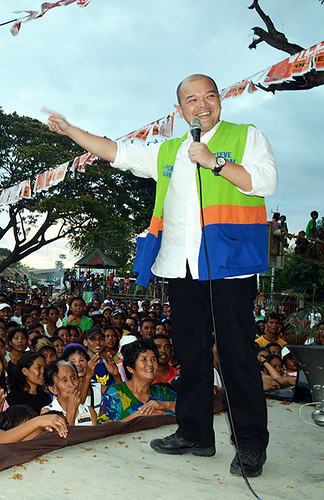News and Events
Alum builds partnerships to advance health care in Philippines
Julia A Vail, for fellows, 2013/06/27 08:06:39

Having spent six years in public office, 2005 Master of International Development Policy alumnus Steve Solon understands that you can’t go it alone when it comes to international development.
In May, Solon was elected governor of the Philippines’ southern province of Sarangani after running unopposed. In his previous role as vice governor, he was responsible for building relationships between the government, private businesses and nonprofits to find long-term solutions to issues such as medical access and the preservation of natural resources.
“With a limited budget, the local government is able to better leverage its funds by partnering with private organizations,” Solon said. “We believe that increasing the private sector and staying away from activities more efficiently done by the private sector will lead to a more productive Sarangani.”
Recently, Solon has worked with NGOs to provide basic services in rural areas, such as treatment for hernias, tuberculosis medication, and even vaccinations for farm animals.
“We had surgeons come in to help with a variety of outpatient services,” Solon said. “In four days we served close to 3,000 people.”
However, he said, the solution was not sustainable. When the volunteers were gone, so was access to critical treatment. With funding from the provincial government, Solon is working to build relationships with private partners for a flagship program by the province’s Rep. Emmanuel D. Pacquiao to upgrade two district hospitals in rural areas and build a new hospital in Alabel, Sarangani’s capital city.
The district hospitals would be outfitted to provide basic medical care, while the hospital in the capital would provide more advanced services such as dialysis.
“Among the leading causes of why people remain in or fall back into poverty is falling ill or the inability to access quality medical care,” Solon said. “By bringing quality hospital services closer to the people, it will make it easier for the local government to accomplish its task of improving the health seeking behavior of communities.”
Government officials and citizens are not the only ones who benefit, Solon said. These partnerships provide advantages for private businesses as well.
“Many large corporations have social responsibility departments who are always on the lookout for government partners that can help them,” Solon said. “The local government has the ability to provide security and familiarity with the community, which results in better service delivery.”
While working on these and other initiatives to improve the quality of life in Sarangani, Solon regularly draws on the training he received at the Duke Center for International Development (DCID) and the Sanford School of Public Policy.
“The policy analysis and development courses I took at Duke are going to help me improve the way research is done in our planning department,” he said. “The most important thing, in my opinion, is to base all of our initiatives on evidence-based research.”
As he moves into his new role as governor in July of this year, Solon said he is committed to working with outside partners, including DCID, to help identify opportunities for improvement and provide better services for the province's approximately 500,000 residents.
“The public-private partnership is alive and well in Sarangani,” Solon said. “I believe this is the way forward.”





